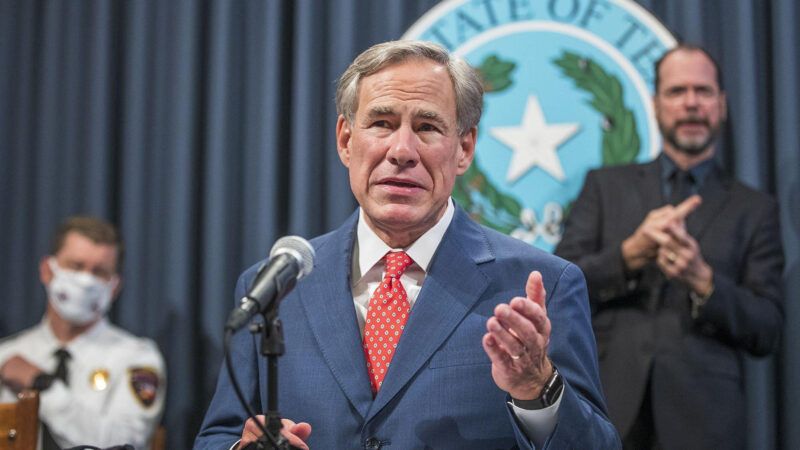The Texas Bill That Prohibits Social Media Censorship Is a Mess
The whole thing is arguably voided by Section 230.

Political bias on social media is one of the biggest issues animating the political right these days, and thus many conservatives talk about doing something to prevent "Big Tech" censorship. Several Republican-controlled states are considering passing legislation designed to accomplish just that.
The Texas Senate, for instance, is poised to approve SB12, which ostensibly prohibits social media companies from restricting their users' speech.
"We need to recognize in Texas, maybe particularly in Texas, we see that the First Amendment is under assault by the social media companies and that is not going to be tolerated in Texas," said Republican Gov. Greg Abbott in support of the bill.
The First Amendment is not under assault by social media companies. On the contrary, the First Amendment defends the free speech rights of private entities—like social media companies—against restrictive government action, like this bill. It would be more accurate to say that the First Amendment is under assault by the Texas legislature. A private company deciding what kind of speech it allows on its platform is precisely the kind of thing the First Amendment protects from government interference.
If that were not enough, the bill has two massive flaws, one of which might render it entirely pointless.
First, the bill defines its terms very broadly: It would prohibit any large social media company (more than 100 million monthly users) from restricting content because of the expressed viewpoint. "An interactive computer service may not censor a user, a user's expression, or a user's ability to receive the expression of another person," the bill reads.
Practically speaking, this could prohibit Facebook and Twitter from taking action against content that is harmful, abusive, or spammy. Facebook's News Feed algorithm makes choices about what kind of content to prioritize, and the platform occasionally opts to limit the reach of some posts—conspiracy theories about the 2020 election, or COVID-19, for instance. The bill would appear to interfere with the day-to-day runnings of the site in very basic ways. It could even force social media sites to take away moderation options from users.
"YouTube and Facebook allow page managers to remove content posted on their community pages," noted Steve DelBianco, president of the trade association NetChoice, in his comments about the bill. "This empowers content creators to curate their pages to suit community interests. However, platforms and websites might remove this capability, since it invites expensive litigation under SB 12."
If that weren't good enough reason to oppose the bill, it also contains a section that appears to render the entire thing obsolete: "This chapter does not prohibit an interactive computer service from censoring expression that the interactive computer service is specifically authorized to censor by federal law."
Under a federal law known as Section 230, social media companies cannot be held liable for "any action voluntarily taken in good faith to restrict access to or availability of material that the provider or user considers to be obscene, lewd, lascivious, filthy, excessively violent, harassing, or otherwise objectionable." In other words, federal law already gives social media companies every right to restrict users' content, and Texas' bill—as written—bows to federal law.
Many Republican legislators at both the state and national level are profoundly misguided about Section 230. They seem to think it's getting in the way of conservatives' free speech rights when in reality it gives Big Tech additional legal cover for continuing to platform right-wing speech. Legislation aimed at hurting social media companies will ultimately end up hurting the kinds of speech that have flourished on Facebook and Twitter but would not have been published in mainstream media outlets.
If anything, that's disproportionately likely to be right-wing speech.



Show Comments (164)